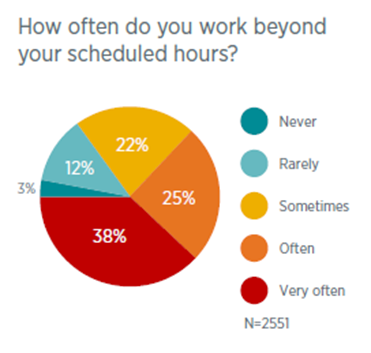Striking the right balance between your work life and home life can be a challenge. In a recent study by the AVMA Trust, 63% of participating veterinarians reported that they “often” or “very often” work beyond their scheduled hours. In addition, 77% of respondents said they consider their daily lives to be work-dominant.
The weight of the mental and physical fatigue that accompanies a physically and emotionally demanding job can often lead to feelings of anxiety, compassion fatigue, or feeling overwhelmed by a large workload. For about 15% of responding veterinarians, the struggle is real and urgent. They are seeking out answers, coping mechanisms, and ways to regain a more sustainable work-life balance or integration.
As one respondent explained, “I feel obligated to help my clients and patients to my own detriment. It is pressure I put on myself. However, that is a recipe for burnout. I am slowly trying to retrain myself to schedule time for myself and not view that as selfish. I am starting to prioritize my own needs so that I am in a better mental position to help others.”
But prioritizing work isn’t always a bad thing. While most veterinarians feel that their current work-life integration is work-dominant, not everyone is dissatisfied with their current experience.
Seasoned veterinarians know what the struggle looks like and shared a wide range of advice, insights, and personal anecdotes that may be helpful to those looking for answers or those who only need to validate that they are not struggling alone. Some of the most helpful, honest, or simply realistic responses can be seen below.
“A five-minute break can be the difference between a crazy shift and a shift that has you so burned out that you don't want to come back.”
“The moment you begin to feel burned out or stressed beyond tolerable, begin to seek help. Help is available. Don't fear opening your life to those who can help.”
“Take a step out of the field for a bit of time if you're feeling burned out. It's helped me remember why I became a veterinarian and that this is where my gifts lay.”
“Figure out what is of most value to you, establish appropriate boundaries (personal and professional), and work toward that which matters most to you. No one else can do this for you.”
“Mental health is key to happiness. Take care of yourself first.”
1The AVMA Trust 2022 Trend Report: U.S.
Veterinarians’ Work-Life Experience is based on a national survey conducted
in fall 2021. N=2,553 Practicing Physicians. N=327 Retired Veterinarians. 95%
confidence, ± 3% margin of error.


